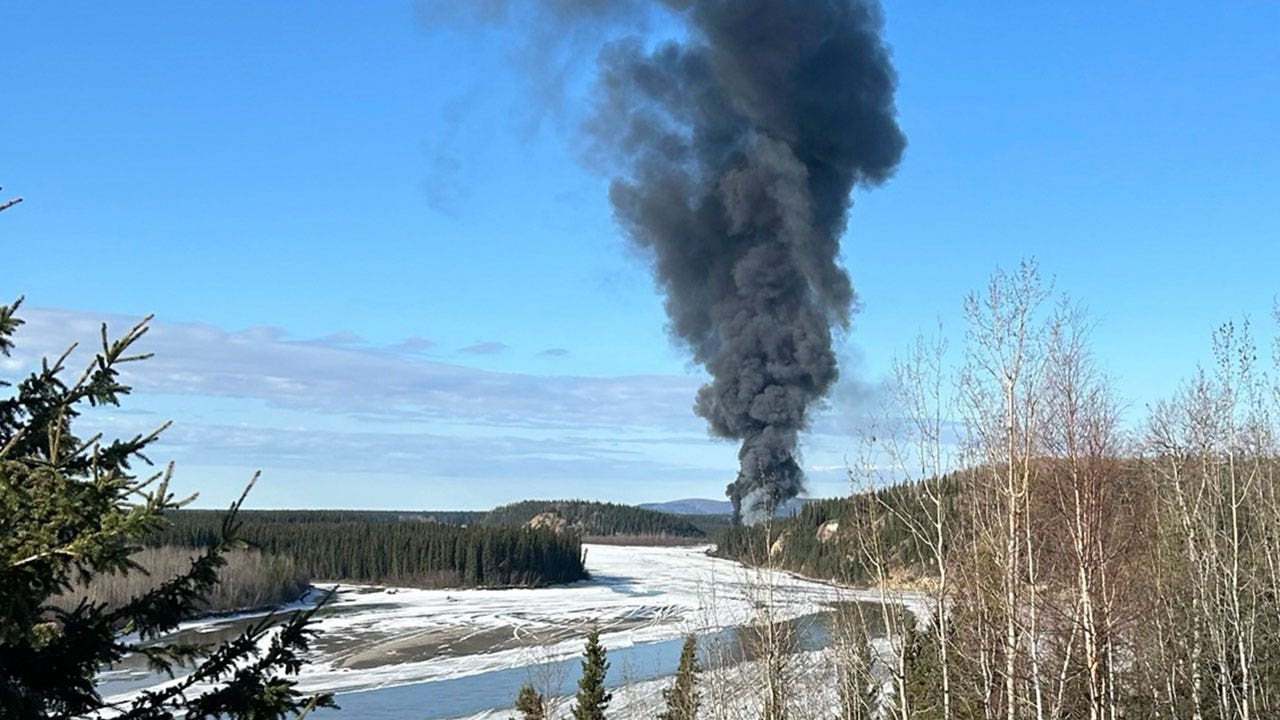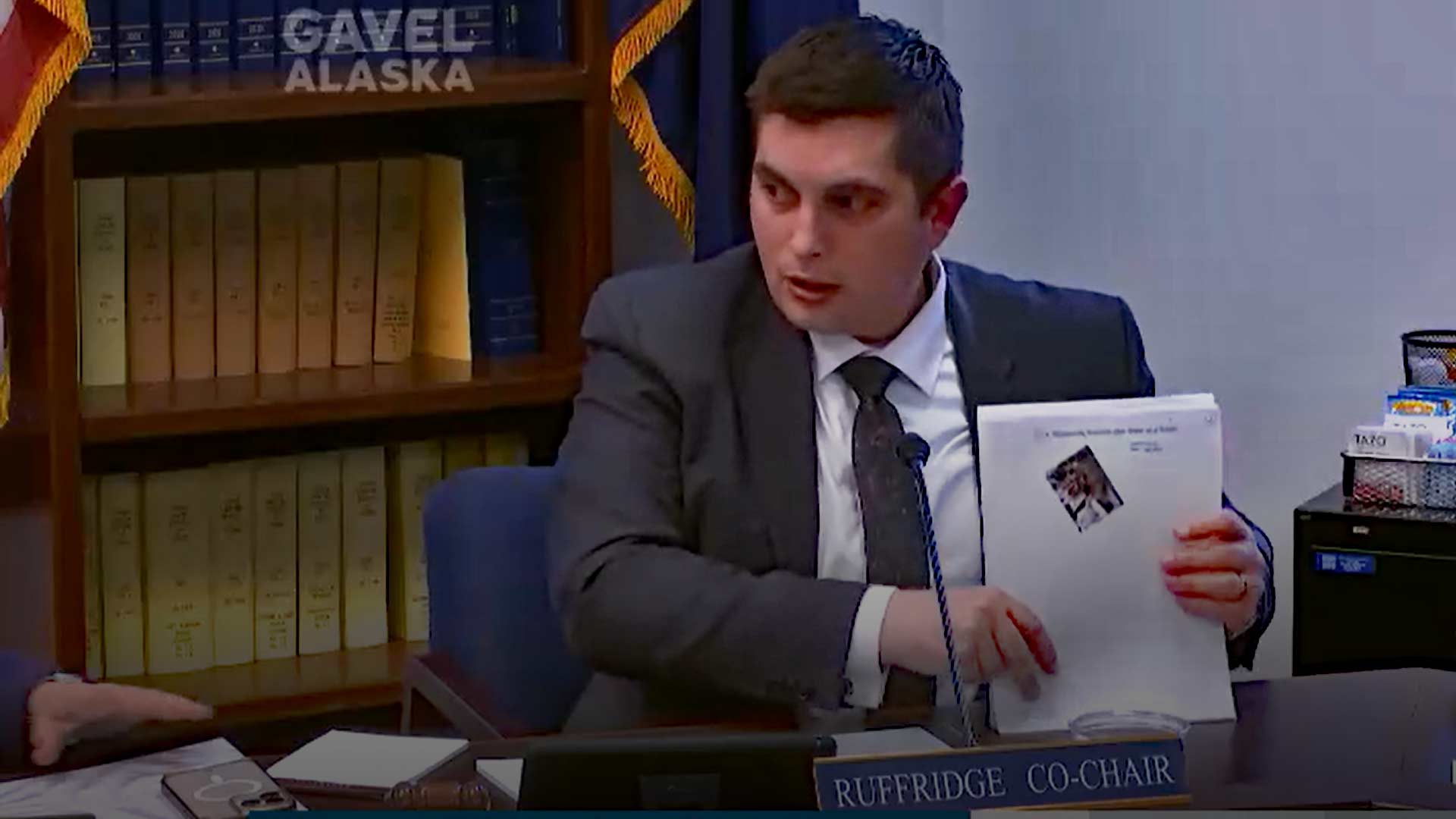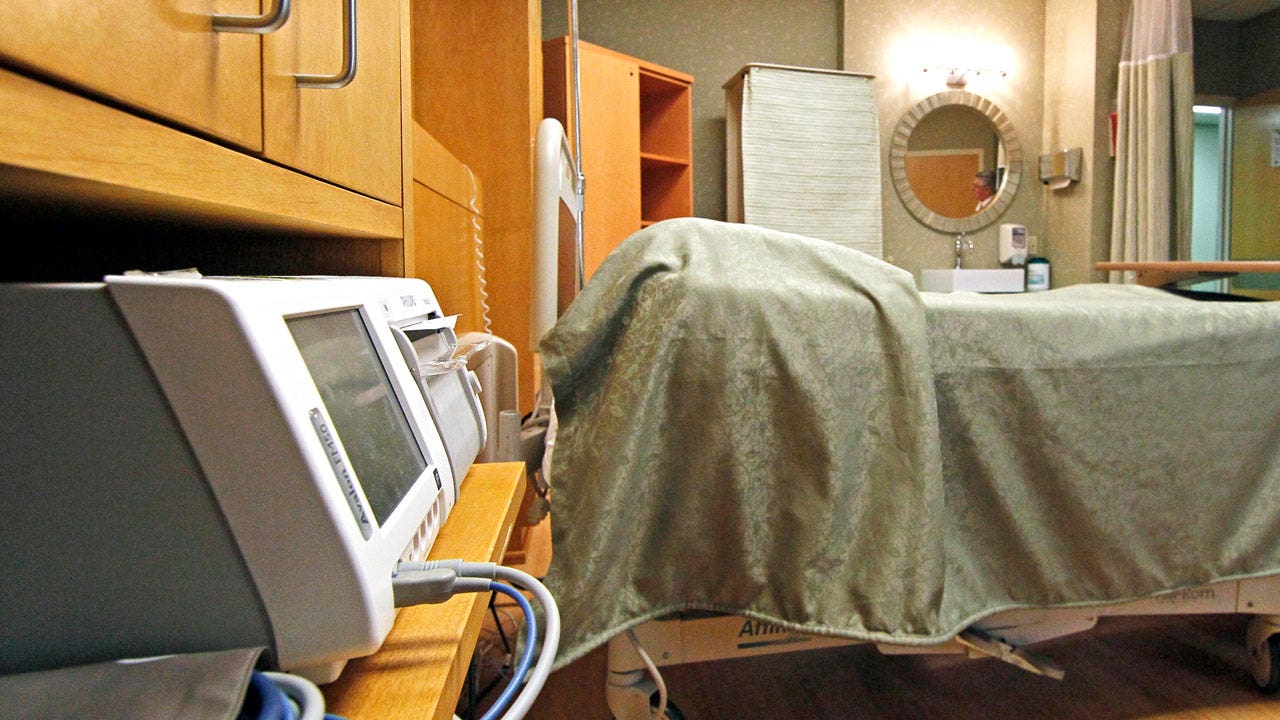Alaska
Pilot reported that plane carrying fuel caught on fire before fatal Alaska crash

One of the two pilots of a vintage military plane that was delivering heating oil to a remote Alaska Native village reported a fire on board shortly before the aircraft crashed and burned outside Fairbanks, killing both of them and leaving debris over a wide area, a federal transportation official said Wednesday.
The pilot made radio contact about the in-flight emergency shortly after taking off Tuesday, said Clint Johnson, head of the National Transportation Safety Board’s Alaska regional office. They were attempting to return to Fairbanks International Airport when they lost contact, he said.
The C54D-DC airplane — a military version of the World War II-era Douglas DC-4 aircraft — crashed about 7 miles outside Fairbanks. It hit a steep hill, slid down an embankment to the bank of the Tanana River and burst into flames. No survivors were found, according to Alaska State Troopers.
ALASKA LAW ENFORCEMENT RESPONDS TO WORLD WAR II-ERA PLANE CRASH WITH 2 PEOPLE ON BOARD
Troopers said recovery efforts would resume Wednesday with the aid of cadaver dogs, but they noted that thin ice and open water on the river were making their efforts difficult. The pilots’ names have not been released.
The partial remains that have been recovered will be sent to the State Medical Examiner’s Office in Anchorage for identification, troopers said.
The roughly 80-year-old plane departed Fairbanks just before 10 a.m., loaded with 3,200 gallons of heating oil destined for Kobuk, an Inupiat village of less than 200 people located about 300 miles northwest of Fairbanks.
Smoke rises after a Douglas C-54 Skymaster plane crashed into the Tanana River outside Fairbanks, Alaska, on April 23, 2024. (Gary Contento via AP)
Mike Emers was working in his office at Rosie Creek Farm, the only outdoor cannabis farm in Alaska, when he heard an explosion, looked out the window and saw the plane on fire.
“I knew it was going down. I just didn’t know where,” he said.
Video from farm security cameras showed the aircraft flying until one of its four engines — the one closest to the fuselage — exploded. The plane then banked and plummeted.
Emers tried to call 911 but couldn’t get through, so he instead reported it to the troopers’ dispatch line. He, his son and a neighbor went to the crash site, where they peered around the corner of an ice shelf and saw huge flames.
“You couldn’t recognize that it was a plane,” he said. “There was debris everywhere, and all the trees were torched, and there was fire everywhere.”
Upslope, they came across more debris that he described as a mix of airplane parts, clothing and personal items. The fire was still burning above the plane, and Emers used his sweatshirt to beat at the flames to prevent them from spreading to more trees, fearing a forest fire could devastate the neighborhood. First responders arrived about 15 minutes later.
Another witness, Gary Contento, was sitting on his deck overlooking the river when he heard a loud explosion, followed by a second one. Looking for what caused the blasts, he saw a burning object on river ice.
“I assumed right off the bat that it was an engine, because it was flaming away,” he said.
He watched for a minute or two as a smoke plume rose into the air, and “then a fireball to beat all fireballs went off.”
Johnson said that in addition to the heating oil, there were about 1,200 gallons of aviation fuel aboard the C54D-DC Skymaster plane.
It is difficult and expensive to get fuel to rural Alaska villages, which are remote and hard to reach because of the state’s limited road system. The Northwest Arctic Borough said heating fuel in Kobuk cost $15.45 a gallon in 2022.
The Alaska Energy Authority said barges usually deliver fuel to coastal communities. But in places where barges can’t run or it’s not economically feasible, air tankers will deliver fuel. And even that can be limited by sea or river ice, water levels or ice road availability.
The C54D-DC is a military version of the Douglas DC-4, a World War II-era aircraft. The planes aided the Berlin Airlift of 1948, when the U.S. and Britain flew food and fuel to Allied-controlled parts of the city after it was cut off by a Soviet blockade.
CLICK HERE TO GET THE FOX NEWS APP
The plane that crashed Tuesday was built in Chicago around 1942 and saw service with the U.S. Army Air Force, the U.S. Navy and the Royal Air Force, before a California company took ownership in 1974, according to the Aerial Visuals Airframe Dossier website. It was later owned by companies in Arizona and Fairbanks, with Alaska Air Fuel taking it over in 2013. The plane was rebuilt between 2018 and 2020,
Alaska Air Fuel, which is based in Wasilla, has not responded to phone messages seeking comment.
The NTSB sent three investigators to the crash scene.

Alaska
Alaska lawmakers advance substitute homeschool bill that preserves annual allotment

After being flooded with letters, emails and public testimony urging them to defend and protect what many see as a key component to make homeschooling a viable option for thousands of Alaskan families, state lawmakers in the House Education Committee advanced a substitute bill on May 3, which would allow Alaska to continue reimbursing homeschool families for educational expenses incurred from tutors, classes, courses and workshops from various private vendors.
Those allotments are currently prohibited thanks to a sweeping opinion by Anchorage Superior Court Judge Adolf Zeman who ruled last month that the allotment program was unlawful because it allowed parents to use funds to help pay for instructional offerings at private and religious organizations and institutions. Zeman believes this violates the Alaska Constitution, which forbids the expenditure of public funds to “directly benefit” private or religious institutions.
While Zeman has issued a temporary stay on his ruling to let the Alaska Supreme Court weigh in, it has cast a dark shadow over the state’s rapidly growing publicly-funded homeschool community, which now stands at roughly 23,000 children, or roughly 18% of Alaska’s public-school enrollment.
In attempting to remedy the problem, and create an allotment program that doesn’t run afoul of Judge Zeman’s interpretation of the state constitution, Alaska lawmakers initially introduced House Bill 400.
This legislation proved highly controversial, however, and was ultimately rejected by the House Education Committee, because it would have vastly restricted how allotment funds are used by specifically limiting expenditures to tutoring that is not provided by a “private or religious educational institution,” and textbooks and curriculum that are not deemed to be “religious, partisan, sectarian, or denominational.”
The most current homeschool allotment bill is worded in such a way that it will allow the State of Alaska to appeal Judge Zeman’s decision to the Alaska Supreme Court without preemptively codifying new restrictions.
Additionally, the original HB 400 would have barred parents from spending allotments on any services or materials provided by a private or religious educational institution, even if it were to study subjects like math, foreign languages, vocational skills, and various other academic disciplines. Likewise, families would not have been able to pay for passes or family memberships to sports or recreation facilities for physical education or training. Nor could they have bought equipment such as basketballs, jump ropes or dumbbells. It would have also banned the purchase of animals, desks, chairs, parking fees or anything deemed “entertainment,” and prohibited payment for testing, other than assessments required by the school district. That might include any number of tests to show aptitude in various subjects.
Finally, the original bill would have prohibited expenditures on taxes on any otherwise approved item, while blocking the ability to buy “permanent items that adhere to or enhance the value of a non-school facility,” which could include chalkboards, bookshelves, greenhouses and any number of items that standard public-school students have access to at brick-and-mortar schools.
In rejecting this version of the bill, the House Education Committee advanced a much shorter and streamlined substitute bill that simply preserves the homeschool allotment program while granting the State Board of Education authority to iron out the details of how those funds can be used.
Moments before the committee voted to advance the bill, Alaska Education Commissioner Deena Bishop briefed committee members about what would happen if the new substitute bill passed out of the Legislature and was signed by the governor.
ALASKA WATCHMAN DIRECT TO YOUR INBOX
She said the Department of Education would issue emergency regulations this summer, which would then go to the Department of Law for review. The proposed regulations would then go before the State Board of Education and then out for public comment. After a final review by the Department of Law, the regulations would undergo another vote by the Board of Education before being implemented for the coming school year. Bishop said the process would likely be finish by August or September.
When asked by Juneau Rep. Andi Story whether any new regulations would specifically prohibit homeschool families from using allotment funds for services provided by religious or private educational institutions, Bishop said the state needed to sort out the difference between an “educational institution” and a “private organization.” She indicated that services and materials would likely be allowable if they came from “private organizations.” It is unclear whether that would allow families to pay for non-religious courses and materials from private “organizations” such as BYU or other entities that may have a religious underpinning.
Bishop added that the most current homeschool allotment bill is worded in such a way that it will allow the State of Alaska to appeal Judge Zeman’s decision to the Alaska Supreme Court without preemptively codifying new restrictions on allotment expenditures before the appeals process has gone through all its steps.
If the State Supreme Court were to uphold Zeman’s decision, Gov. Dunleavy has indicated that his administration is prepared to appeal to the U.S. Supreme Court, if necessary.
The bill advanced without objection and is now headed to the House Finance Committee. If it passes the House, it will then head to the Senate before going to the governor.
TAKING ACTION
— Click here to read the new substitute homeschool allotment bill.
— Click here to contact members of the House Finance Committee, where the bill is currently set for consideration. To email all members at once, use this address: House.Finance@akleg.gov.
Click here to support Alaska Watchman reporting.
Alaska
State lawmakers hear public testimony on possible legislative actions to ruling on homeschooling reimbursements

JUNEAU, Alaska (KTUU) – As the State of Alaska appeals a ruling that would delay a decision on Alaska’s homeschool correspondence funding until the end of June, public testimony was heard Friday in Juneau on separate House and Senate bills that are viewed as possible, legislative actions to a judge’s ruling.
This is after a Superior Court judge struck down an Alaska law in April that allows parents of homeschooled students to use public dollars for private education purposes, ruling it unconstitutional. Thursday, a judge granted a delay and Friday the State of Alaska appealed Thursday’s delay as the House Education committee asked Alaska correspondence program leaders how their programs work during its invited testimony for for HB 400. Public testimony was also heard on SB 266.
On Thursday Superior Court Judge Adolf Zeman issued the short-term stay on his decision, that it is a violation of the state constitution for public funds to be used to reimburse homeschool families expenses at private and religious institutions, putting lawmakers back at work on Friday to explore options for a legislative fix.
With the end of session less than two weeks away, the chairs of House Education and Senate Education said Thursday they want to get legislation passed before the end of session to provide a level of security for Alaska’s correspondence programs. Interior Distance Education of Alaska Homeschool Director Dean O’Dell showed support for HB-400. The bill would adopt regulations for individual learning plans, monitor allotments and perform annual reports for accountability.
Unlike the Senate bill, the House bill allows for unused reimbursement funds to be rolled over. O’Dell said IDEA checks to make sure families are being reimbursed for expenses that were authorized by the students’ individual learning plans. O’Dell said travel reimbursements are prohibited by the school’s local board until it’s for something specific such as a competition. O’Dell was asked why that should be an allowed expense.
“Literature organizers, in-state travel to competitions and other items are commonly provided in schools,” O’Dell said. “Among those unintended consequences, a prohibition on many of these items, including PE equipment will negatively impact rural students for more than our urban students, creating serious equity issues.”
Brian Rozell, principal of Cyberlynx Homeschool and Correspondence program, was read a memo sent in 2022.
“I’ll just read you the line that’s concerning,” said House Education co-chair Rep. Justin Ruffridge, R-Soldotna. “It says, ‘and be reimbursed for their private school tuition to the amount of their student allotment. I think that might give the indication that someone would be using their allotment or tuition for what they could for their tuition.”
Rozell said the memo was written in the “very early days” of his school’s understanding of what is an allowable expense under the process, telling lawmakers tuition is no longer an allowable reimbursement under his school’s program, but he, like others who testified, doesn’t see anything wrong with a family being reimbursed for a student enrolling in a non-sectarian class at a private school.
Rep. Andi Story, D- Juneau, said she found that confusing.
“I would think as the correspondence program, you would see they’re enrolled in that private school, and you would think, “Oh, that is part of what they’re getting from being enrolled in tuition,’ so I would think it would be something that you would not approve.”
Lawmakers were going through amendments late into Friday as the bill remained in committee.
One of the amendments from Rep. Rebecca Himschoot, N/A Sitka, would prevent allotments to be used for services provided to a student from a family member.
Senate Version
The Senate homeschool funding bill would repeal the current language the judge cited in his initial decision that the funding uses are unconstitutional. The bill would also reinstate components of 2005 and 2008 correspondence study program regulatory packages promoted by the Alaska Department of Education and Early Development.
Changing the term “allotment” to “fund account,” the bill still authorizes correspondence programs to provide students with monies to pay for academic instruction and materials and stipulates that funds cannot be used for private and religious school education expenses. The bill also removes the blanket opt-out provisions of statewide assessment and prevents allotments of education funds from being rolled over.
Those in opposition spoke out about the bill removing rules allowing families the ability to opt-out of statewide assessments, the bill preventing any remaining reimbursement money from being rolled over and restrictive language related to allowable expenses and private tutoring.
“My son enrolled in 2015, and I have been saving up his allotment for him to take higher education classes, pilot training, whatever he wants. We have $15,000 saved up,” parent Maria Michalski said, Palmer.
Larry Sloan, Homer, spoke in support of the Senate bill.
“I do support this proposed bill because it does help to clarify a central, political social issue of our time, which is a so-called wall of separation between church and state,” Sloan said
There were more public testifiers who spoke in favor of the House bill versus the Senate bill.
SB-266 is is in the Senate Education committee where members have more amendments to introduce.
Copyright 2024 KTUU. All rights reserved.
Alaska
Calling each other ‘woke’ and ‘incompetent,’ mayoral candidates debate with Alaska’s News Source

ANCHORAGE, Alaska (KTUU) – Alaska’s News Source hosted a conversation Friday between incumbent Mayor Dave Bronson and former Anchorage Assembly Chair Suzanne LaFrance.
The answers weren’t timed, but the candidates were redirected if one person dominated the talks.
The first fiery exchange began with the topic of homelessness.
Bronson was questioned about why he allowed the living conditions at the homeless camp near Cuddy Family Midtown Park to continue.
He was also quick to point a finger at the Anchorage Assembly, which did not allow his mass shelter in East Anchorage to be built.
The Assembly in May 2022 set aside $6.2 million for its construction, but Assembly members stopped construction a few months later after learning that Bronson officials skirted city code, pushing ahead with millions in work without first getting the required contract approvals from the Assembly.
“We caught the mistake,” Bronson said. “We went to the Assembly and said we made a mistake. Let’s reappropriate. John Weddleton … former Assembly member at that time, says, ‘That’s happened before in the city several times. So let’s just keep going.’”
LaFrance said “maybe” similar mistakes happened in the past.
“But the fact of the matter is that the costs ballooned by millions of dollars,” LaFrance said.
She went on to say the estimated costs didn’t look right.
“There is, you know, certainly a cost to homelessness, and the crisis response that we’ve seen over and over — again, it just wasn’t good stewardship of taxpayer dollars to say yes to something that didn’t have a viable plan and that had already failed,” LaFrance said.
Later, Bronson said the former Northway Mall could be used as a shelter. He also pointed out how difficult it is to truly solve the problem.
“If people drove around town and didn’t see any homeless on the street, they would think this problem would be solved. But I said it wouldn’t be solved,” Bronson said.
LaFrance’s homeless strategy has been criticized with critics saying her call for more meetings on the topic is not a solution.
“The action plan now is to actually have a plan,” LaFrance said.
In a follow-up question, LaFrance said she’d have a shelter plan in place within 100 days of her becoming mayor.
“I do not support 1,000-person shelters in East Anchorage, or ,anywhere in the community,” LaFrance said.
Bronson said the city has put smaller shelters out to bid, but no one has shown interest.
Bronson has called LaFrance “woke,” and LaFrance has called him “incompetent.”
“I bring up the word incompetent because it applies,” LaFrance said.
Bronson said being “woke,” among other things, meant men wearing “tutus.”
But then he shifted his criticism.
“I’ll call it this: tax and spend liberal,” he said. “She’s a tax and spend liberal.”
Inadequate snow plowing for two years that has led to schools being closed also resulted in a heated conversation.
“At the end of the day, Miss LaFrance has to remember — when you criticize snowplowing, you’re criticizing the people that do it,” Bronson said. “Am I responsible for snow plowing? I’m responsible for everything in the city.”
“When I am criticizing the snow removal — or lack of — the last two winters, I am criticizing Mr. Bronson as the CEO of our city,” LaFrance replied. “I’m not criticizing the employees who have worked hard.”
Ballots were mailed to voters April 30. Runoff election day is Tuesday, May 14, and ballots must be postmarked on or before that date to be counted.
Voters may also return completed ballots to secure drop boxes around the municipality, or vote in person at one of the city’s voting centers starting May 7.
After the main debate, we asked the candidates to answer some of the questions from the local Community Councils. Hear their answers on Alaska’s Political Pipeline.
Copyright 2024 KTUU. All rights reserved.
-

 News1 week ago
News1 week agoLarry Webb’s deathbed confession solves 2000 cold case murder of Susan and Natasha Carter, 10, whose remains were found hours after he died
-

 News1 week ago
News1 week agoFirst cargo ship passes through new channel since Baltimore bridge collapse
-

 World1 week ago
World1 week agoHaiti Prime Minister Ariel Henry resigns, transitional council takes power
-

 World1 week ago
World1 week agoSpanish PM Pedro Sanchez suspends public duties to 'reflect'
-

 World1 week ago
World1 week agoUS secretly sent long-range ATACMS weapons to Ukraine
-

 News1 week ago
News1 week agoAmerican Airlines passenger alleges discrimination over use of first-class restroom
-

 Education1 week ago
Education1 week agoVideo: Johnson Condemns Pro-Palestinian Protests at Columbia University
-

 Movie Reviews1 week ago
Movie Reviews1 week agoAbigail Movie Review: When pirouettes turn perilous

/cdn.vox-cdn.com/uploads/chorus_asset/file/25385620/247058_Mothers_Day_Gift_Guide_MLouart.jpg)












